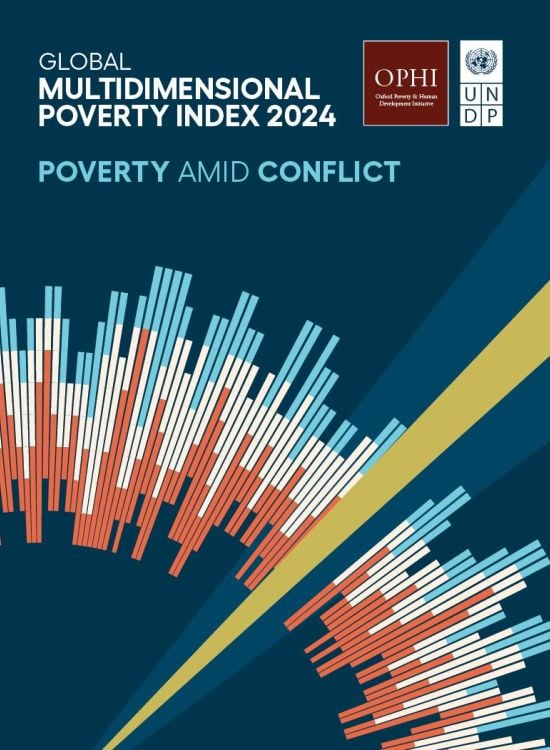2024 Global Multidimensional Poverty Index (MPI)
Poverty amid conflict

UNDP (United Nations Development Programme). 2024. 2024 Global Multidimensional Poverty Index (MPI): Poverty amid conflict. New York.
2024 Global Multidimensional Poverty Index (MPI)
Poverty amid conflict
This 2024 Global Multidimensional Poverty Index (MPI) report overlays violent conflict data with multidimensional poverty data to better understand their interlinkages across countries and over time. The Uppsala Conflict Data Program (UCDP) is the primary data source, but sensitivity analyses were also run using other key conflict datasets. The report finds that MPI values tend to be much higher in conflict-affected settings. And in countries affected by protracted conflict, poverty reduction is reversed, stagnant or slower.
This year’s update of the global MPI database includes new data from 20 countries. It presents MPI data from 112 countries covering 1,359 subnational regions. The results show that 1.1 billion of 6.3 billion people live in acute multidimensional poverty, over half of them children. Common deprivations include a lack of adequate housing, sanitation, electricity, cooking fuel, nutrition and school attendance. Reaching the last mile to eliminate global poverty requires careful attention to people living in contexts of violent conflict.
Key Findings (2024, across 112 countries)
1.1b
People live in Multidimensional Poverty
455m
Poor people live in countries exposed to violent conflict
584m
Poor people are children under 18
76
Countries reduced poverty
MPI Indicators
Dimensions of Poverty | Indicator | Deprived if living in the household where… | Weight |
Health | Nutrition | Any adult under 70 years of age or any child for whom there is nutritional information is undernourished. | 1/6 |
Child mortality | Any child under the age of 18 years has died in the family in the five-year period preceding the survey. | 1/6 | |
Education | Years of schooling | No household member aged ‘school entrance age + six years or older has completed at least six years of schooling. | 1/6 |
School attendance | Any school-aged child is not attending school up to the age at which he/she would complete class eight. | 1/6 | |
Standard of living | Cooking Fuel | The household cooks with dung, wood, charcoal or coal. | 1/18 |
Sanitation | The household’s sanitation facility is not improved (according to SDG guidelines) or it is improved but shared with other households. | 1/18 | |
Drinking Water | The household does not have access to improved drinking water (according to SDG guidelines) or improved drinking water is at least a 30-minute walk from home, round trip. | 1/18 | |
Electricity | The household has no electricity. | 1/18 | |
Housing | At least one of the three housing materials for roof, walls and floor are inadequate: the floor is of natural materials and/or the roof and/or walls are of natural or rudimentary materials. | 1/18 | |
Assets | The household does not own more than one of these assets: radio, television, telephone, computer, animal cart, bicycle, motorbike or refrigerator, and does not own a car or truck. | 1/18 |